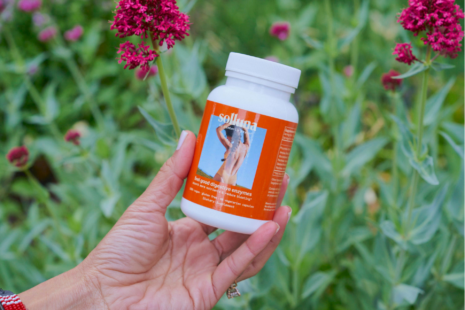
What are digestive enzymes? Basically, without digestive enzymes, your body can’t break down foods. This means that when you eat, even when you’re eating nutrient-dense whole foods, your body cannot fully absorb the nutrients if you lack the necessary enzymes to digest your food fully!
Your digestive system is an incredible and fine-tuned machine, but it’s only one component of what makes you you. Not only that, digestive health is such an integral part of your overall health too.
Every system in your body is connected— it only takes one broken spoke to warp your wheel! But if you keep your wheels aligned, you can ride freely and enjoy the beauty of total health.
Digestive enzymes fuel many of the most essential parts of your digestion. Without enough enzymes, your body may experience uncomfortable symptoms like bloating, cramping, abdominal discomfort, constipation, diarrhea, fatigue, and swelling.
Your stomach acid may be the first thing you think of when it comes to digestive enzyme production, but there’s so much more to them than that! Each enzyme is essential in breaking down food and ridding your body of unnecessary waste.
The three primary types of enzymes work to break down protein, fats, and carbohydrates. Think of it this way, your digestive system is like a well-oiled machine that helps keep you healthy. And your digestive enzymes ensure the machine stays runs smoothly at full power.

How Are Digestive Enzymes Different From Systemic Enzymes?
Every one of our cells uses enzymes for building, maintenance, and repair. Your body creates some enzymes itself, while your diet makes up for the rest.
Systemic enzymes support overall health and wellness. Systemic enzymes work throughout your entire body to clear out cellular waste. They support liver function, boost your immune system, promote circulation, break down mucus, and more!
Digestive enzymes are chemical compounds that help break down the food you eat. They exist in your saliva and are released by other organs in your digestive tract— including your pancreas, stomach, liver, gallbladder, and intestines. All of these enzymes are beneficial to different parts of your digestion.
Digestive enzyme supplements also help your body break down the important macronutrients protein, carbohydrates, and fat from the foods you eat.
Three Main Types of Digestive Enzymes
Here are three main types of digestive enzymes that break down macronutrients into smaller compounds so that your body can absorb them:
- Amylase enzymes reside in your saliva and start predigesting carbohydrates the moment you put food in your mouth. This is one reason it is so important to chew your food thoroughly! Chewing your food produces more saliva, and your digestive process gets an extra head start.
- Lipase is a crucial enzyme when it comes to breaking down fats. Your body needs lipase to break down fats into fatty acids later used to produce energy. Lipase increases your body’s ability to digest fats and helps prevent bloating and gas.
- Protease enzymes break down proteins into shorter amino acids. Protease enhances nutrient delivery to your working muscles and helps your body absorb essential amino acids. When your protease enzymes work efficiently, your muscles can recover, repair, and grow.
When they work together, these enzymes digest your food and ensure healthy digestion, allowing you to absorb the most nutrients from your diet.
A balanced digestive system is a vital sign of a healthy gut. Balanced digestion can help you feel beautiful inside and out. With good digestion, you may notice your tummy is flatter and smoother, your hair is thicker and shinier, and your skin is brighter, clearer, and younger-looking. Who wouldn’t love that?! :)
Of course, the first step in achieving balanced digestion is your diet! Eating natural, nonprocessed foods can significantly impact your body’s digestive process.
Why Are Raw Foods Easier To Digest Than Processed Foods?
Raw foods are enzymatically alive. They contain live enzymes that help you digest that food. When food is cooked or processed, they are enzymatically dead. This means there are no live enzymes to help your body digest the food and your body relies more heavily on your own digestive enzymes to fully digest the meal you’ve just eaten.
You Need Live Enzymes To Digest Food
After swallowing, your food travels to the esophagus and ends up in the upper portion of your stomach to predigest.
This process typically takes up to an hour, but if you’re eating only dead food without any live enzymes, your body doesn’t have a way to predigest the food because your body doesn’t produce enzymes in the upper portion of your stomach.
Then the food travels down to the lower part of your stomach. This is where gastric enzymes like pepsin, the main gastric enzyme, and hydrochloric acid (HCl) break the food down further.
If you are only eating processed foods, your body struggles to fully digest the food. When partially digested food is left in your intestinal tract, it can putrefy, leading to harmful bacteria growth.
Prioritize Raw and Organic Foods For Digestion
Today, there are often fewer live enzymes in food. I often write about and encourage shopping at local farmers’ markets and buying organic whenever possible to increase the likelihood your food will contain a healthy ratio of these important enzymes.
Foods that have been irradiated for longer shelf life or GMO foods have fewer enzymes. So not only do you rely more on your own digestive enzymes to break down all the processed and cooked foods you eat, but your body requires more enzymes to break down any of the raw foods available today.
Without enough of these essential enzymes working hard to perfect your digestive process, you may experience side effects like sluggish digestion, a change in bowel habits and find yourself at risk of multiple digestive issues.
What Happens if You Have Enzyme Deficiency?
Have you ever had a terrible stomach ache and wondered why you never properly appreciated those wistful times when you could sit down without pain? You just don’t think much about some things until they’re not working properly, and digestion is no exception!
How often do you ignore your digestion until you’re feeling backed up, bloated and uncomfortable?
Digestive enzyme deficiency can create various health conditions depending on which enzymes your body is struggling to produce. Some of these include:
- Lactose intolerance: If your small intestine doesn’t produce enough of an enzyme called lactase, your body can’t break down lactose— the natural sugar in dairy products. Many people with irritable bowel syndrome (IBS) are lactose intolerant, and it’s common for adults to become lactose intolerant. Around 65 percent of people worldwide have a reduced ability to digest lactose as they age. I personally advise against consuming dairy of any kind, whether you can produce lactase or not, and offer tips for ditching dairy once and for all.
- Chronic pancreatitis: Your digestive enzymes need to reach your GI tract before they start working. When you have chronic pancreatitis, your pancreatic enzymes begin working while still in your pancreas. This can cause damage to your pancreas over time.
- Celiac Disease: Celiac Disease occurs when your body can’t digest gluten, which is a common protein found in many foods. It can also interfere with how your body absorbs nutrients from food.
- Exocrine pancreatic insufficiency (EPI): This occurs when you have a deficiency in your exocrine pancreatic enzymes. This disorder can make it very difficult for you to digest food properly and can cause abdominal pain and constipation. [1]
Symptoms of Enzyme Deficiency
Digestive enzyme deficiency can cause gastrointestinal distress, as well as symptoms like:
- Bloating
- Abdominal pain
- Gas
- Diarrhea
- Oily stools or loose bowel movements
One way to prevent these symptoms and counteract enzyme deficiency is to take a digestive enzyme supplement.
What Do Digestive Enzyme Supplements Do?
Digestive enzyme supplements are just what they sound like, supplements to enhance the level of digestive enzymes in your body.
Many enzyme formulas combine the three main types of digestive enzymes needed to break down the macronutrients protein, fat and carbohydrates, strengthen your overall digestion and absorption of nutrients and help you stay regular.
A good digestive enzyme supplement contains amylase, lipase, protease, and other enzymes your body doesn’t make naturally, such as lactase or alpha-galactosidase. Alpha-galactosidase helps reduce the amount of gas your body produces after eating foods rich in fermentable carbohydrates like fruits, vegetables, grains, and legumes.
Digestive enzyme supplements also make it easier for your body to break down fiber which can potentially cause digestive problems. That’s right, even though fiber is a vital part of your diet, it can be hard to digest sometimes. This is especially true if you’re new to a plant-based diet.
Despite a healthy lifestyle change, your body isn’t used to all that fiber— which is why so many new vegans experience a lot of gas and bloating at the very beginning.
This can be very frustrating initially, but a good digestive enzyme can help!
The reason fiber can be so hard to digest is that, even though we need it, soluble fiber naturally resists digestion. It can pass through your digestive tract without being digested because it helps move food and waste out of your body. This can cause the soluble fiber to ferment in your gut, causing gas and bloating. [2]
With the right supplements, a healthy diet, and time, this discomfort happens much less frequently.
Feel Good Digestive Enzymes— Even on Days When You Feel Not-So-Good
Even if you strive to eat well and get plenty of stimulating exercise, your digestion may still need a little help from time to time. That’s why I’ve also put together digestion tips that are easy to digest :), and recommend taking enzymes before meals. It’s especially beneficial to take enzymes when you’re eating lots of fiber or processed foods.
Even if your digestive troubles are rare and out of place, stomach aches and bloating can wreak havoc on your physical health.
Some days they may even get bad enough to force you to spend your day in pain or too long in the bathroom. In our perfectly imperfect lives, it happens to us all sometimes. :) But don’t worry, Beauty! This is where my Feel Good Digestive Enzymes come in.
I always formulate products to be an ideal supplement for myself and never cut corners! That means our Solluna digestive enzyme supplement includes two times more fat-digesting lipase (to break down all of those healthy beauty fats!), amylase, and protease. PLUS it contains enzyme strains specially formulated in a proprietary blend to help you break down a plant-based high fiber diet.
With this extra boost, your digestion will stay strong— even on the days when you may not be able to eat as well as you want. Life happens, and we all take cheat meals from time to time!
This enzyme supplement will help aid your body’s digestive process and help you get more out of your food! That means more nutrients, less gas and bloating, and healthy digestion, even when you need it most.
These feel good enzymes are even more powerful when combined with the prebiotics, postbiotics and probiotics in my Feel Good SBO Probiotics+ and Detoxy 2.0.
The good bacteria in the soil based probiotics are vital for your overall digestive health, and Detoxy can help your whole body cleanse itself from toxins gently and naturally. Combine the powerful effects of all three supplements in Solluna’s Feel Good Starter Kit.
Remember, all your body’s systems are connected— when you take care of your gut health, you take care of the rest of your beautiful self too.
When In Doubt— Listen to Your Body!
Remember, Beauty— your body is like a fine-tuned system. When it’s well-maintained, it works spectacularly, and you feel great! But if one part of the system isn’t working, you can feel everything else start slowing down. Within your body, it’s usually because your digestion is feeling a little sluggish and backed up.
If something isn’t working, your body will tell you so! Your body knows what it needs to stay healthy and run smoothly. So listen to your body if something is amiss.
By listening to your body, you can truly understand what you need to be at your healthiest and most vibrant. :)
Lots of love,
Citations
- Warner, Jennifer. “Recognizing Malnutrition with EPI.” EverydayHealth.com, www.everydayhealth.com/hs/exocrine-pancreatic-insufficiency/epi-recognizing-malnutrition/.
- “Digestive Enzymes & Fiber.” Livestrong, Leaf Group, www.livestrong.com/article/363094-digestive-enzymes-fiber/.







0 Comments